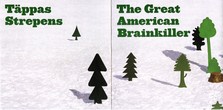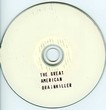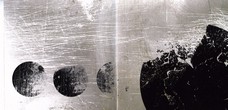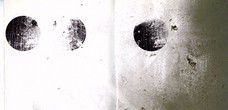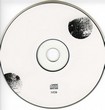|
|
|
It's a label showdown! Welcome to round 22 in the label showdown series between Metronomicon Audio and Jester Records!
Since we've more or less totally missed out on reviewing the output of these two great labels, we are going
through their entire catalogues, matching the releases from each label consecutively against each other.
Humorously counting goals Match preview The Upland release comes in a jewel case and a booklet with art. The match The Great American Brainkiller is the 4th release from Täppas Strepens, Metronomicon's political voice,
at least considering his matter-of-fact lyrics, often speaking against injustice and the sickness of the western world.
Musically, Strepens is not afraid of repeating himself, often using the same pattern of four guitar strumming chords,
and not bothering to change them much from one song to the next. But Strepens' main focus is on the lyrics, and this time they
are printed The album starts off with "Various Angry Ramblings", an up-tempo song where Strepens displays his view on world leaders (visionless word spillers), the police (wasting time chasing kids with spray cans), the advertisement business (spreading garbage on the same walls), women's magazines (portraying women as lifeless), record companies (greedy music-hating bastards), world of fashion (pretenders), and finally Strepens himself (but he won't listen). Good to see some humour at the end there, after raising his fists againts half the world. The lyrics sum up Strepens viewpoint, which can easily be described as a socialist one, at least many Americans would say so. "Yeller Cab" is slowing down musically, and it's more elaborate lyrically, describing how living in big cities can make people feel superficial and dehumanized, blinded by speed and technology. The mid-tempo "Radio Europe" is a history lesson for both Europeans and Americans, where Strepens lashes out against the US for being a nation with no cultural history, obsessed with physical largeness and ignorant about the native Indians, while Europe's cultural history is depicted as a history of oppression by and struggle against inbred leaders. And according to Strepens it all goes back to Jesus, who was "pretty cool", but after that it went downhill. How this connects to the French getting a whipping for making all their pornos look like art, beats me. Then he moves on to the Middle East conflict, telling both sides to wisen up, before pointing the finger at Norway and finally me and you: "And I guess that only leaves me and you and let's just be honest we're idiots too.". Everybody can improve. Slowing down again with "Ketchup & Wrestling", whose lyrics are a little more cryptic, perhaps a sleepy
anthem partly supporting trash culture and its users/victims. It goes without saying that the up-tempo "Janet Jackson's Nipple"
is commenting on the US culture, and the lyrics are simply put a shortlist of the many paradoxes of the American way
way of living, thinking, acting, believing and looking at other people and nations. I wouldn't go on tour in
the US with this song, unless you like a good beating and cold cell floors. Slowing down a bit, "They Speak In Slogans"
comments on the "drive-thru opinions" (what a great phrase! To sum it up: Though there is next to no variation musically There is very little info included in Upland's self-titled release, but this seems to be the brainchild of Knut Andreas Ruud.
The included art folder depicts what appear to be a shattering ball (or globe), so don't prepare yourself for an uplifting session.
"Flex" starts off with reptilian clicks, soon rhythmic, developing into almost funky patterns panning between left and right channels.
"Twin Gap" also use these same kind of short noisy blips, adding synth chords, electronic pots and pans, again with extreme stereo effects.
"-nd Falling" sounds like a wacky synthetic accordion with lots of reverb, played to a broken drum machine going half amok.
"Root" is more ambient, like crystal glasses and empty metal barrels resonating to their different frequencies,
while "Block" returns to fast ticking from electronic insects with spooky monotonous synth tones.
"Carrier Down" is on the melancholy side, with keyboard tones to sparse bass and right/left rhythmic noises and the occasional bursts of clicks,
creating a feeling of alienated sadness from a mechanized world To sum it up: Upland's will to experiment is clear. Admittedly, I'm not a fan of
the kind of fast rhythmic/arrhythmic glitch/noise that is used throughout several of these tracks, I find them
to be distracting rather than involving when fired this rapidly Match result: Metronomicon Audio 4 (
Next match Copyright © 2011 Knut Tore Breivik
|
| You may also want to check out our Täppas Strepens articles/reviews: Beans, Bacon & Gravity, The Future Will Be Better Tomorrow. |
| © 2011 FuzzLogic |
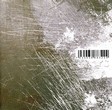
 Täppas Strepens: The Great American Brainkiller
Täppas Strepens: The Great American Brainkiller